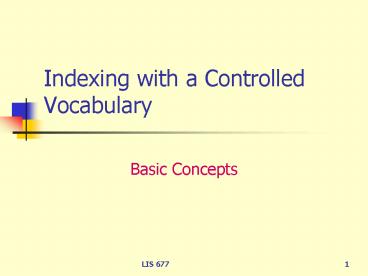Indexing with a Controlled Vocabulary - PowerPoint PPT Presentation
1 / 21
Title: Indexing with a Controlled Vocabulary
1
Indexing with a Controlled Vocabulary
- Basic Concepts
2
Indexing Topics Covered
- The concept triangle
- The five-axiom theory of indexing
- The indexing process
3
The Concept Triangle
Referent
Expression
Concept
4
The Referent
- The referent is everything about which a
meaningful statement can be made. - For example, about a certain table many
statements can be made concerning the material of
which it is made, its price, purpose, producer,
weight, the structure of its surface, etc.
5
The Concept
- We define the concept as the sum of the
essential statements that can be made about a
referent. - Essential statements are those which contribute
to the characterization of the referent itself. - Inessential statements are those which do not
contribute to the characterization of the
referent itself.
6
Kinds of Concepts
- General concepts
- The general concept describes a class of
interrelated referents. - For example metal, oxidation, information
- Individual concepts
- The individual concept is one to which no
meaningful conceptual feature can be added. - For example Albert Einstein Fritz the Cat.
7
General vs. Individual Concepts in Indexing
- It is the task of subject indexes to provide
access to documents or text passages relevant to
general concepts. - An information system which works quite well for
individual concepts, may totally fail when it is
required to manage general concepts too.
8
The Mode of Expression
- Lexical expressions
- linear strings of characters commonly agreed upon
to express concepts or concept connections - Non-lexical expressions
- linear strings of characters by which concepts or
concept relations are expressed and upon which no
firm agreement has been made
9
Forms of Expression Indexing
- Lexical expressions require little indexing work
- Often appear in Identifier fields rather than in
Descriptor fields of database records - Non-lexical expressions require indexing work
- non-lexical expressions exhibit ambiguity and
multiplicity
10
Concepts Expressions
- Individual concepts are almost always expressed
lexically - General concepts are almost always expressed
non-lexically - In natural, uncontrolled language there is an
unlimited multitude of non-lexical, paraphrasing
expressions for concepts - Multiplicity ambiguity of natural language
expressions are largely restricted to general
concepts
11
Five-Axiom Theory of Indexing
- Definability
- Order
- Sufficient degree of order
- Representational predictability
- Representational fidelity
12
Axiom of Definability
- The compilation of information relevant to a
topic can be delegated (to a skilled specialist
or a programmed search mechanism) only to the
extent to which the inquirer can define the topic
in terms of concepts and concept relations.
13
Axiom of Order
- Any compilation of information relevant to a
topic is an order-creating process. - Order is defined as the meaningful proximity of
the parts of a whole at a foreseeable place.
14
Axiom of Sufficient Degree of Order
- The demands made on the degree of order increase
as the size of the collection and/or the
frequency of the searches and/or the specificity
of the searches increases.
15
Axiom of Representational Predictability
- The completeness of any search for documents
relevant to a topic of interest depends on the
predictability of the modes of expression for
concepts in the search file. - Successful searches require a language with
predictable modes of expression for concepts.
16
Axiom of Representational Fidelity
- The precision of any search for documents
relevant to a topic of interest depends on the
fidelity with which the modes of expression for
concepts can be expressed in the systems
language.
17
The Indexing Process
- Step 1
- Determine the essence of a document
- Step 2
- Represent this essence with sufficient degrees of
predictability and fidelity
18
Importance of Categories
- The predictability of essence selection is
markedly enhanced when the indexers have an
orientation to conceptual categories. - For example, in some chemistry databases, all
descriptors belong to the following categories - MATTER
- LIVING ENTITY
- APPARATUS
- PROCESSS
- In ERIC, the nine Descriptor Groups serve as
categories.
19
Natural Language Indexing
- Natural language expressions, as derived from
original texts, can only in the case of
individual concepts lead to an information system
of adequate quality and survival power. - The specificity of natural language expressions
is compromised by their lack of predictability.
20
Importance of Cutters Rule
- Precise and complete searches require that the
most specific descriptors that the vocabulary
provides be chosen for the indexing of a subject. - A query with a specific descriptor must not
retrieve concepts that are more general than the
search descriptor.
21
Importance of Syntax
- In the interests of enhanced representational
fidelity any advanced indexing language needs a
syntax in addition to its vocabulary. - The syntax should represent the manner in which
the concepts are connected with each other in the
texts to be stored.































